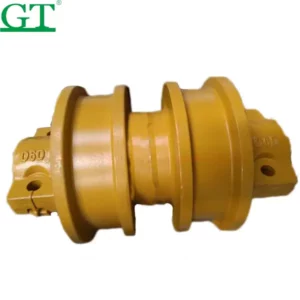How does the quality of manufacturing and materials affect the reliability of a excavator track rollers?
The quality of manufacturing and materials significantly affects the reliability of excavator track rollers. Here’s how:
- Material Strength and Durability: High-quality materials, such as hardened steel or alloy steel, are essential for manufacturing track rollers that can withstand the demanding conditions encountered in construction and earthmoving applications. These materials offer excellent strength, toughness, and resistance to wear, abrasion, and impact, ensuring that the track rollers can withstand heavy loads, rough terrain, and harsh environments without premature failure.
- Precision Manufacturing: Precision manufacturing processes, including machining, forging, heat treating, and surface finishing, are crucial for producing track rollers with tight tolerances and consistent quality. High-precision manufacturing ensures that the components fit together seamlessly, operate smoothly, and withstand the stresses and forces encountered during operation, reducing the risk of premature wear, misalignment, or failure.
- Heat Treatment and Surface Hardness: Proper heat treatment techniques, such as quenching and tempering, are essential for enhancing the hardness, strength, and durability of track roller components, particularly the bearing surfaces and contact areas. A hardened surface layer helps to resist wear, abrasion, and indentation, prolonging the lifespan of the track rollers and minimizing the need for frequent replacement.
- Sealing and Lubrication: High-quality sealing materials and lubrication systems are critical for preventing contamination, moisture ingress, and premature wear of the track roller bearings. Effective seals help to retain lubricants and keep contaminants out, ensuring smooth operation and extending the service life of the bearings. excavator track rollers for sale Proper lubrication reduces friction, heat generation, and wear, maintaining the reliability and performance of the track rollers over time.
- Quality Control and Testing: Rigorous quality control measures and testing procedures are essential for ensuring the reliability and consistency of excavator track rollers. Quality control checks throughout the manufacturing process help to identify and rectify any defects or deviations from specifications, ensuring that only high-quality rollers are delivered to customers. Testing procedures, such as load testing, hardness testing, and dimensional inspection, verify the performance and integrity of the track rollers under simulated operating conditions, providing assurance of their reliability and durability in the field.
- Supplier Reputation and Certification: Choosing a reputable supplier with a proven track record of manufacturing high-quality track rollers is essential for ensuring reliability and performance. Suppliers with ISO certification or other quality management certifications adhere to strict quality standards and processes, providing confidence in the quality and reliability of their products.
Overall, the quality of manufacturing and materials directly impacts the reliability of excavator track rollers. By using high-quality materials, employing precision manufacturing processes, implementing effective heat treatment and surface hardening techniques, ensuring proper sealing and lubrication, maintaining rigorous quality control, and selecting reputable suppliers, manufacturers can produce track rollers that meet the demanding requirements of heavy-duty construction equipment and provide reliable performance in the field.

